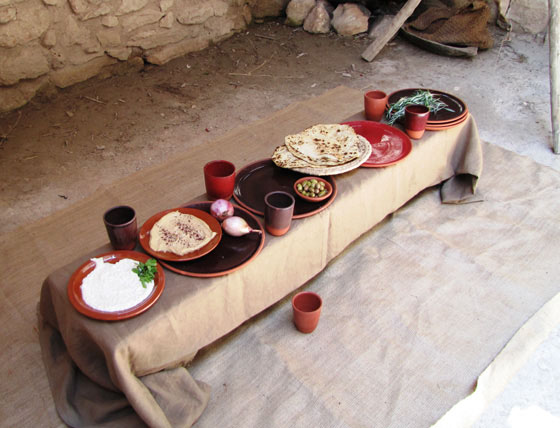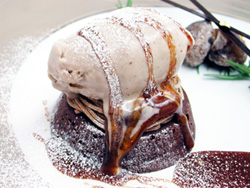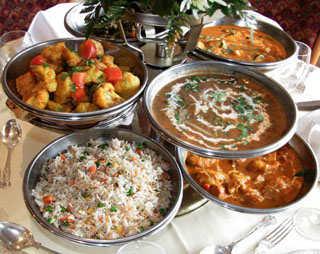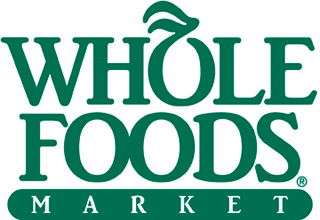| « Satisfied but not Inspired at La Grande Vie | Holiday Eats: Hopleaf » |
Random Tue Dec 10 2013
Rhubarb and Race: Food as a Cultural Artifact

In the age of bacon-cronut porn, we forget that food is more than just an aerial shot of full-colored, megapixeled gluttony. It is a cultural artifact -- an anthropological treasure trove of meaning that interweaves the past with the future, the constant with the transient. In Food, Race, and Ethnicity, Yong Chen writes that "Food is important not only as a physical necessity; it is also an indication of the multitude of relationships that we form with others as individuals, communities, and nations. Indeed, food has embedded political, socioeconomic, and cultural meaning."
 In that respect, food provides the perfect lens for understanding social theories. E.N. Anderson writes, "Unlike sex habits, they are easy to study. Unlike religion, they are grounded in obvious biological fact; no one can deny the reality of food or of starvation. Unlike politics, they are not often the subject of highly polarized and violent debate. They rank with kinship -- social scientists' favorite institution for cross-cultural study -- in being universal, well recorded, and usually highly structured." But as a food writer, I find that very few people in my field use food to highlight, interpret, or change certain social phenomena. Writers either represent food in an urgent, guilt-laden manner, or fetishize it into glamorous cooking and eating -- there is very little middle ground.
In that respect, food provides the perfect lens for understanding social theories. E.N. Anderson writes, "Unlike sex habits, they are easy to study. Unlike religion, they are grounded in obvious biological fact; no one can deny the reality of food or of starvation. Unlike politics, they are not often the subject of highly polarized and violent debate. They rank with kinship -- social scientists' favorite institution for cross-cultural study -- in being universal, well recorded, and usually highly structured." But as a food writer, I find that very few people in my field use food to highlight, interpret, or change certain social phenomena. Writers either represent food in an urgent, guilt-laden manner, or fetishize it into glamorous cooking and eating -- there is very little middle ground.
Now, I'm not suggesting that a serious critique of food trumps restaurant gossip and burger slideshows, but if food were discussed (and reported) in a more cultural way, it may provoke thought and hopefully, change. While the relationship between food and culture is astoundingly complex, I've personally found interest in the connection between food and race/ethnicity.
Food indicates one's position within society, and individuals communicate their status through the foods they eat, and more importantly, the foods they don't eat. For instance, Robin Fox writes that "people will struggle to eat things they loath, and avoid perfectly tasty food that is on the forbidden list." In a 2011 Psychological Science article, researchers found that many US immigrants consume typical American foods to prove their "American-ness."
Corresponding author Cheryan states, "In American society today, being American is associated with being white. Americans who don't fit this image -- even if they were born here and speak English -- feel that pressure to prove that they're American." In the study, Asian-American and white college students were asked about embarrassing childhood memories, and compared to 27% of white respondents, almost 68% of AA respondents recalled being embarrassed using chopsticks in public and consuming unusual animal parts (e.g. chicken feet, fish eyes). Along similar lines, I know many Indians who refuse bringing leftovers to work because they don't want to "stink up" the lunchroom. Even "international" or "ethnic" aisles at grocery stores -- while helpful in locating curry paste at Jewel -- connote standards of ethnic normalcy. The point is this: if people didn't treat "other people's foods" as exotic or foreign delicacies, their acceptance would signal a genuine attempt in cultural understanding.
 Just as minorities may enhance their social status by eating richer, more mainstream, and larger quantities of food, wealthy individuals have increasingly (and ironically) adopted vegetarian, gluten-free, and juice-cleansing diets. I personally can't explain why that trend exists, but many label these restrictive diets as a form of white privilege, especially humorists: "Now veganism is not exclusive to whiteness, but no other group takes such pride in their food lifestyle choices as white people do. For white people, food choices are a personal statement, and much like other personal statements white people make, they have to make sure EVERYONE knows."
Just as minorities may enhance their social status by eating richer, more mainstream, and larger quantities of food, wealthy individuals have increasingly (and ironically) adopted vegetarian, gluten-free, and juice-cleansing diets. I personally can't explain why that trend exists, but many label these restrictive diets as a form of white privilege, especially humorists: "Now veganism is not exclusive to whiteness, but no other group takes such pride in their food lifestyle choices as white people do. For white people, food choices are a personal statement, and much like other personal statements white people make, they have to make sure EVERYONE knows."
 After all, most people associate organic avocados, Whole Foods (maybe Trader Joes), and free-range beef with wealthier, white shoppers. While these associations may seem offensive (and exceptions obviously exist), they're ultimately grounded in some level of reality. That I can accurately predict a shopper's demographics based on their food purchasing habits may seem trivial, but it also highlights how much our food choices reflect our personal identities.
After all, most people associate organic avocados, Whole Foods (maybe Trader Joes), and free-range beef with wealthier, white shoppers. While these associations may seem offensive (and exceptions obviously exist), they're ultimately grounded in some level of reality. That I can accurately predict a shopper's demographics based on their food purchasing habits may seem trivial, but it also highlights how much our food choices reflect our personal identities.
Food also reveals interesting insights on race and ethnicity from a broader societal perspective. For instance, why is Chinese cuisine so established and popular when the Chinese comprise less than 3% of the US population? Along a similar vein, why is there "low-class" and "high-class" Asian cuisine? (Jeffrey Pilcher explains that "the relative scarcity and wealth of Japanese compared to Chinese migrants helped sushi to gain more favor than dim sum in contemporary America.") Furthermore, that certain races (mainly black and Hispanic) are strongly associated with hunger and obesity demonstrates how food can paint a somber portrait of racial inequality in the US.
On a different tangent, the management hierarchy of the restaurant business also mirrors the racial dynamics prevalent in other industries. General managers and CEOs are mostly white while the chefs and cooks remain largely minorities. Even within the staff, the lower positions (i.e., dishwashers, line cooks) are almost always minorities, although I've personally rarely seen African Americans working in restaurant kitchens. Consumers of restaurant production also exhibit racial differences. According to a 2013 Placed report, the biggest predictor of fast food preference is ethnicity:
Caucasians: Taco Johns, Culver's, Tim Horton's, Steak 'n Shake, Caribou Coffee
Hispanics: Pollo Tropical, El Pollo Loco, In-N-Out Burger, Wienerschnitzel, Del Taco
African Americans: Church's, Checkers, Popeye's Chicken & Biscuits, Krystal, Rally's
Asians: Jamba Juice, In-N-Out Burger, Jack In The Box, Starbucks, Panda Express
By studying how we eat, what we eat, where we eat, and who we eat with, one can glean a tremendous amount of knowledge on how an individual or culture functions. I've presented many ideas connecting race/ethnicity with food, and many of them don't revolve neatly around one central theme. I admit, it's messy and it's complicated. So what does it mean? Why care? Sociology isn't journalism, and journalism isn't sociology. I can't speak for anyone else, but I believe that presenting food in a more anthropological manner creates stronger, more respected writing.









jen / December 10, 2013 1:28 PM
I'm sorry, what was the point here? What ethnicity corresponds with rhubarb?
Bayless gets a lot of shit for being into Mexican culture and cuisine, and anyone white deemed to be *too* into another culture's clothing or music is deemed to be culturally appropriating them (see: Miley Cyrus).
Your entire paragraph about whiteness and vegetarianism also makes no sense - when you say that minorities enhance social status by eating more mainstream, but then also quoting, "For white people, food choices are a personal statement"... aren't all people(who aren't living in poverty) then making a statement with their food choice?